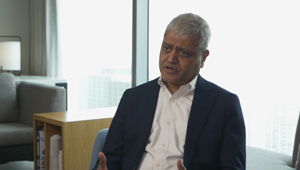Video
Dr Sanjiv Agarwala talks about exciting new results presented at ASCO 2018 in melanoma, including the durability of anti–PD-1 therapy in providing 40% overall survival at 5 years, updates on adjuvant therapy showing superiority of anti–PD-1 over anti–CTLA-4, and new results in combining immunotherapies. Read More ›
Dr David Spigel talks about currently available and emerging biomarkers that predict the greatest sensitivity to immunotherapy, including his insight into PD-L1, MSI, and TMB. Read More ›
Dr David Spigel discusses how medical oncologists and the rest of the cancer care team can best communicate with pathologists to help make informed treatment decisions for individual patients and set up new assays for emerging biomarkers as they are discovered. Read More ›
Dr David Spigel reviews 3 of the most important, practice-changing topics at ASCO 2018: new therapies targeting RET in a number of tumor types, a prognostic biomarker assay to predict whether patients with breast cancer will need adjuvant hormonal therapy or chemotherapy, and the minimum level of PD-L1 positivity required to predict outcomes with immunotherapy in lung cancer. Read More ›
Dr David Spigel considers how patient-reported outcomes, as well as palliative and supportive care, are revolutionizing cancer care so that consideration is being given to treating the patient, not just the cancer. Read More ›
Dr David Spigel discusses the 2 major themes highlighted at ASCO 2018: the use of cancer biomarkers to achieve precision therapy, and fine tuning treatment of patients with immunotherapy with respect to who to treat, how to treat, and how to predict clinical outcomes. Read More ›
Dr Thomas Bachelot is careful to set reasonable expectations for his patients with HR+/HER2- metastatic breast cancer regarding how long their treatment will last and how it will impact them. Read More ›
Hope Rugo, MD, discusses common presenting symptoms of HR+/HER2- metastatic breast cancer, citing bone metastasis as the most prevalent. Read More ›
Dr Matthew Goetz addresses common questions that arise when patients with HER+ metastatic breast cancer have progressed on a CDK4/6 inhibitor plus an aromatase inhibitor. Read More ›
Dr Matthew Goetz believes that, as more mature data come into existence, the demonstration of a survival advantage will guide more patients with metastatic breast cancer to try CDK4/6 inhibitors plus aromatase inhibitors instead of chemotherapy. Read More ›










